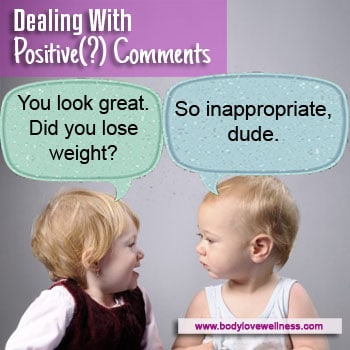
Original image credit: fotomagique / 123RF Stock Photo | Text & additional photoshopping by Golda Poretsky
A few months ago, I wrote a post about dealing with negative comments. You gave me some really positive feedback on it, but a number of you raised the question of how to deal with positive or seemingly positive comments.
It’s a great question. How do you deal with stuff like:
“You look great. Did you lose weight?”
“You have a great ass!”
“You look gorgeous today.”
Now, these compliments may seem mostly positive or innocuous, particularly the last one. But so much will depend on this one big factor:
Context! Context is everything, right? By context I mean the relationship between the complimenter and the complimentee, and the complimentee’s current and past body image issues.
When Weight Loss Is Tied To A Compliment
I have a somewhat different take on this than you might expect.
I think people are, in some ways, nearly literally blinded by weight loss culture. So when they read something or someone as beautiful they make an automatic connection between beauty and weight loss. I really don’t blame people for that. I think that most of us who have woken up from weight loss culture have been truly hurt by it (or have great empathy for someone close to us who has been hurt by it), so people who haven’t had that experience often just see our current weight loss culture as normal.
So the question becomes, what do you do in the moment? Depending on the context and your relationship to that person, you can handle the compliment of “You look great. Did you lose weight?” in many ways.
Probably Easiest: Say “thanks!” and move on to other things. It’s really not your job to educate anyone about weight bias nor answer any questions about weight loss.
Use Humor: I’m a big fan of using humor, but I’m usually one of those people who thinks of witty retorts when it’s way too late. If you feel comfortable, you can always say something like, “Thanks! But just so you know, I’m still the same gorgeous fatty I was yesterday!” (If you have some good retorts, let me know!)
Set Boundaries: Say something like, “Thanks for the compliment, but I would appreciate it if you wouldn’t comment on my weight or any perceived weight loss.”
Repeat As Desired
People who give inappropriate comments often fall into two camps: (a) they’re completely unaware that their compliments are inappropriate, backhanded, or just plain weird or (b) they don’t really care if they’re being inappropriate.
These two groups are probably two of the hardest groups to set boundaries with. Seriously.
So it’s going to take some repetition if you really want them to change the way they talk to you. And it may actually be impossible. That’s why I’m a big fan of saying thank you and then thinking about other things. But that doesn’t mean you shouldn’t try to set boundaries. It may just take a ton of repetition and a great well of patience.
Just Saying Thank You Is Very Powerful
I’m of the opinion that most compliments are really that — someone notices something lovely about you and wants to let you know that they see it. Receiving real compliments can be a healing practice, especially when you haven’t felt consistently good about yourself and your appearance.
You don’t need confirmation from the outside world that you’re a gorgeous person inside and out, but it’s still nice to get it now and again. So I want to share a special practice for receiving compliments. It’s extremely simple but powerful!
How it works:
Complimenter: “You have a lovely smile!”
You: Pause and give yourself a second to receive the energy of that compliment. Then say, “Thank you.”
Complimenter: “You’re welcome.”
Why it’s lovely:
When you actually receive a compliment, both you and the complimenter feel good. It’s a wonderful exchange of positive energy. When you say, “Thank you” you’re basically saying, “I’m receiving that compliment and agreeing with you.”
The complimenter feels good because they gave you a gift that you received and enjoyed, plus they had the pleasure of being agreed with. And you feel good because you received a gift and had the pleasure of feeling recognized and agreed with (since you already know you have a beautiful smile).
When you don’t feel great about yourself or your body, receiving compliments can be extremely difficult. If you’re in this boat, try this practice and let me know how it goes!
Golda is a certified holistic health counselor and founder of Body Love Wellness, a program designed for plus-sized women who are fed up with dieting and want support to stop obsessing about food and weight. Check out her upcoming events below!
In Person
November 2-4th, Zion, Illinois — I’ll be leading three workshops at The Abundia Retreat!
November 14th, New York City — I’ll be reading my story, “The Fat Queen Of Speed Dating”, along with other contributors to Hot & Heavy: Fierce Fat Girls on Life, Love and Fashion at Bluestockings Book Store. (Info is here.)
Online
This Week Only — Free Web Training On Some Of My Most Unorthodox & Powerful Ways To Heal From Food & Body Image Issues (sign up here!)
November 13th — Will be sharing 5 Simple Tips For A More Relaxed (And Fun) Holiday as part of the Happy HAES Holidays Program (check it out)
(Listen to this post here, or subscribe on itunes.)

“Receiving real compliments can be a healing #bodyimage practice.” – @bodylovewellnes http://t.co/Q5bKJ7wK
I was just talking to a co-worker about this recently!
My standard response is a cheery “Nope. Just pretty fit”. Which is all true. I enjoy the opportunity to point out that fatties can be fit and glowy too. And the cheeriness makes it less of a contradiction (because I just don’t like to contradict compliments – I kinda like them too much).
Backhanded compliments are received by men, too. I often hear things like “Gee, you look like you’ve lost weight. Looks good!” (My actual weight has a mind of its own and is stable at 210 lbs plus or minus 10-20 pounds for many years.) I even get that from people who are fully aware of my size acceptance orientation. My answer is nearly always the same: “Actually, my weight goes up and down. These new pants make me look thinner, I guess.”
For reasons like that, I decided to NEVER comment on the size or even the physical appearance of someone I meet–even when I think they look nice. It can open a whole can of worms, and risk making them feel bad, no matter how I phrase my admiration…now isn’t that a shame?
When people compliment me and ask me if I’ve lost weight my response is generally a cheerful and chipper, “nope.” if they persist, sometimes I will add, “no, I’m just happy.” or say, “oh, I hope not, I bought some fabulous last month/season.”
People like giving compliments and I personally would find it rude to outright reject one. Yet, I want to challenge people to think about whether weight is really a proxy for beauty and to learn not to assume that someone wants to lose weight. That’s why I always answer no, regardless of whether I’ve lost a little or not. It’s a way to disrupt their assumption without engaging in a big education session about body positivity. Instead, I choose to model body positivity by being relentlessly cheerful about receiving the compliment, while refusing to agree with their assessment of my body.
Thanks for this great post. I make it a habit to compliment people whenever I think they deserve it. Complete stranger at the store with great hair? I tell her. Great tie at the bank? I tell him. It’s my way of spreading great cheer throughout the world I exist in.
99% of the time, people seem genuinely pleased. But the 1% who seem offended make me feel awful that I even spoke up! Luckily I have a thick skin and recover enough to continue. But I then question my practice of complimenting strangers!
Golda, thanks for this awesome article! I confess to that horrible internet habit of having clicked the link expecting to hate it. But not at all.
During the last three years or so, I gained more weight than my doctor thought was healthy. I am working on losing it. Your references to weight loss culture raised my red flags. As Americans, we seem to have an awfully difficult time separating bullying from genuine concern about health, especially in much of the recent media attention to ‘fat shaming’.
But the real problem throughout my life, at various heights and weights, has been body image. I might lose this excess baggage and my physical heart will be the better for it. My emotional heart, however, still feels like a lumpy, pre-pubsecent nerd with more acne than boobs. Critcisms, all of them, that fail to acknowledge what is beautiful about me and succumb instead the the judgment of advertisements crafted not for my well-being but to get my hard earned income out of my wallet.
So I was THRILLED that your top advice is to learn to accept the spirit of a compliment rather than a list of ways to turn that compliment into a social commentary and confrontation. This is far more healing and healthy for everyone involved. Setting boundaries, when realistically achievable, is a great idea too. :D
Whenever someone tries to engage me in weight or diet talk I say “I despise talking about weight, it’s so boring!” Usually shuts people right up. No one wants to be boring!
This is a tough one to do, because when you set this particular boundary you’re so far outside the indoctrination of diet culture that you’re almost speaking a different language. I had to set a firm boundary with a socially inept co-worker who thought she could get every female in the office to be her friend by showering them with compliments. She would ask most of them at least once a week if they’d lost weight. When I told her that I don’t consider it a compliment, and that I didn’t consider it appropriate to comment on other peoples’ bodies, it was as if I’d grown a second head. I had to firmly request half a dozen times for her to not comment on my weight or body before it got through, and then there was some resentment against me for not playing “the game”. You know, the great game of body shame that “all” women play? :-)
At any rate, be prepared for some negativity. If it gets touchy, make sure you stick to it as a personal boundary (“I don’t like comments about my body”) instead of a general principle (“comments about peoples’ bodies are inappropriate”). The second invites debate, while the first is just a statement of preference and much less aggressive.
Thanks for posting. It never occurred to me that I could set a boundary and ask people not to comment :D Setting boundaries is such a hard thing to do (for some people).
Related to receiving positive comments, is the habituation of them. For example, I lost a huge amount of weight and got to a normal body weight. I had tons of compliments about how nice I looked. Now I’ve regained -some- of the weight. I don’t look horrible. But I notice when those same people DON’T say anything now. I suspect I’m just being too self-conscious, but it’s hard not to take a lack of a compliment as a comment.
{New} How To Deal With Positive(?) Comments About Your Body http://t.co/Hu00h0Ff #bodyimage #boundaries #selfcare